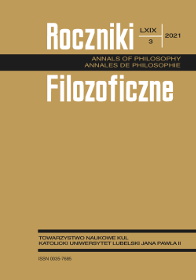“You Would Not Seek Me If You Had Not Found Me”—Another Pascalian Response to the Problem of Divine Hiddenness
Abstrakt
„Nie szukałbyś mnie, gdybyś mnie nie znalazł” – inna pascalowska odpowiedź na problem Bożego ukrycia
Jedna z wersji problemu skrytości dotyczy ludzi, którzy szukają Boga i martwią się, że Go nie znajdują. Mając na uwadze tak strapionych poszukiwaczy Boga, Blaise Pascal wyobraził sobie Jezusa, który mówi im: „Nie szukałbyś mnie, gdybyś mnie nie znalazł”. To właśnie nazywam Pascalowskim Warunkiem Ukrycia (PWU). W pierwszej części tego artykułu twierdzę, że PWU prowadzi do nowej interpretacji odpowiedzi Pascala na problem ukrycia, znacząco odmiennej od interpretacji Pascala u Hicka czy Schellenberga. Krótko mówiąc: dla każdej osoby, która jest przygnębiona nieznalezieniem Boga i która (z tego powodu) poważnie rozważa argument z ukrycia, PWU wykazuje, że ich własne cierpienie jest dowodem na to, że Bóg w rzeczywistości nie jest dla nich ukryty (ponieważ pragnienie Boga zostało w nich wzbudzone przez samego Boga). W drugiej części artykułu odkładam na bok pytanie egzegetyczne i staram się rozwinąć tę oryginalną strategię jako współczesną odpowiedź na jedną z wersji problemu ukrycia, którą nazywam „problemem pierwszej osoby”. Twierdzę, że strategia PWU oferuje wiarygodną odpowiedź na problem pierwszej osoby. W rezultacie nawet jeśli musimy uzupełnić strategię PWU innymi, bardziej tradycyjnymi strategiami (aby odpowiedzieć na inne wersje problemu), strategia PWU powinna być prawdopodobnie częścią pełnej historii o Bożym ukryciu.
Bibliografia
Adams, Robert Merrihew. The Virtue of Faith and Other Essays in Philosophical Theory. New York: Oxford University Press, 1987.
Anderson, James. Paradox in Christian Theology: An Analysis of Its Presence, Character, and Epistemic Status. Carlisle: Paternoster Press, 2007.
Aquinas, Thomas. Summa Contra Gentiles. Translated by Vernon Joseph Bourke. Notre Dame, IN: University of Notre Dame Press, 2001.
Benedict XVI. Homily for the Mass of the Lord’s Supper, 21 April 2011. Vatican City: Libreria Editrice Vaticana, 2011. Accessed May 4, 2021. http://www.vatican.va/content/benedict-xvi/en/homilies/2011/documents/hf_ben-xvi_hom_20110421_coena-domini.html.
Bernard. “Sermon XIII for the Advent Season.” In No Uncertain Sound, Sermons That Shaped the Pulpit Tradition, edited by Ray C. Petry, 143–67. Philadelphia: Westminster Press, 1948.
Bernard. On Loving God. Text version made available online by Paul Halsall. Generic NL Freebook Publisher. Accessed May 2, 2021. https://www.ccel.org/ccel/bernard/loving_god/loving_god.ix.html.
Gregory. “Homily 30.” In Homilies on the Gospels, Patristic Bible Commentary. Accessed March 31, 2021. https://sites.google.com/site/aquinasstudybible/home/gospel-of-john-commentary/gregory-the-great-homily-30-on-the-gospels.
Hick, John. Faith and knowledge. London: Macmillan, 1967.
Howard-Snyder, Daniel, and Adam Green. “Hiddenness of God.” In The Stanford Encyclopedia of Philosophy (Winter 2016), edited by Edward N. Zalta. https://plato.stanford.edu/archives/win2016/entries/divine-hiddenness.
Lecuit, Jean-Baptiste. Le désir de Dieu pour l’homme: une réponse au problème de l’indifférence, 2017.
Leduc-Fayette, Denise. Pascal et le mystère du mal: la clef de Job. Paris: Cerf, 1996.
Lewis, Clive Staples. Mere Christianity : A Revised and Amplified Edition, with a New Introduction, of the Three Books, Broadcast Talks, Christian Behaviour, and Beyond Personality. San Francisco: Harpe, 2001.
Michon, Cyrille. “Is Atheism (the Fact) Good Evidence for Atheism (the Thesis)? On John Schellenberg’s Argument from Ignorance.” European Journal for Philosophy of Religion 7, no. 1 (2015): 71–88.
Nagel, Thomas. “Sexual Perversion.” The Journal of Philosophy 66, no. 1 (1969): 5–17. https:// doi.org/10.2307/2024152.
Nazianzen, Gregory. “Oration 40: The Oration on Holy Baptism.” Translated by Charles Gordon Browne and James Edward Swallow. New Advent. Accessed May 4, 2021. https:// www.newadvent.org/fathers/310240.htm.
Pascal, Blaise. Pensées. Translated and edited by A. J. Krailsheimer. London: Penguin Books, 1966.
Poston, Ted, and Trent Dougherty. “Divine Hiddenness and the Nature of Belief.” Religious Studies 43 (2007): 183–98.
Rahner, Karl. “Anonymous Christians.” Theological Investigations 6 (1969): 390–98.
Rea, Michael. The Hiddenness of God. Oxford: Oxford University Press, 2018.
Schellenberg, J. L. Divine Hiddenness and Human Reason. Ithaca, NY: Cornell University Press, 1993.
Schellenberg, J. L. “On Not Unnecessarily Darkening the Glass: A Reply to Poston and Dougherty.” Religious Studies (2007): 199–204.
Schellenberg, J. L. The Wisdom to Doubt: A Justification of Religious Skepticism. Ithaca, NY: Cornell University Press, 2007.
Swinburne, Richard. Providence and the Problem of Evil. Oxford: Clarendon Press, 1998.
Copyright (c) 2021 Roczniki Filozoficzne

Utwór dostępny jest na licencji Creative Commons Uznanie autorstwa – Użycie niekomercyjne – Bez utworów zależnych 4.0 Międzynarodowe.





